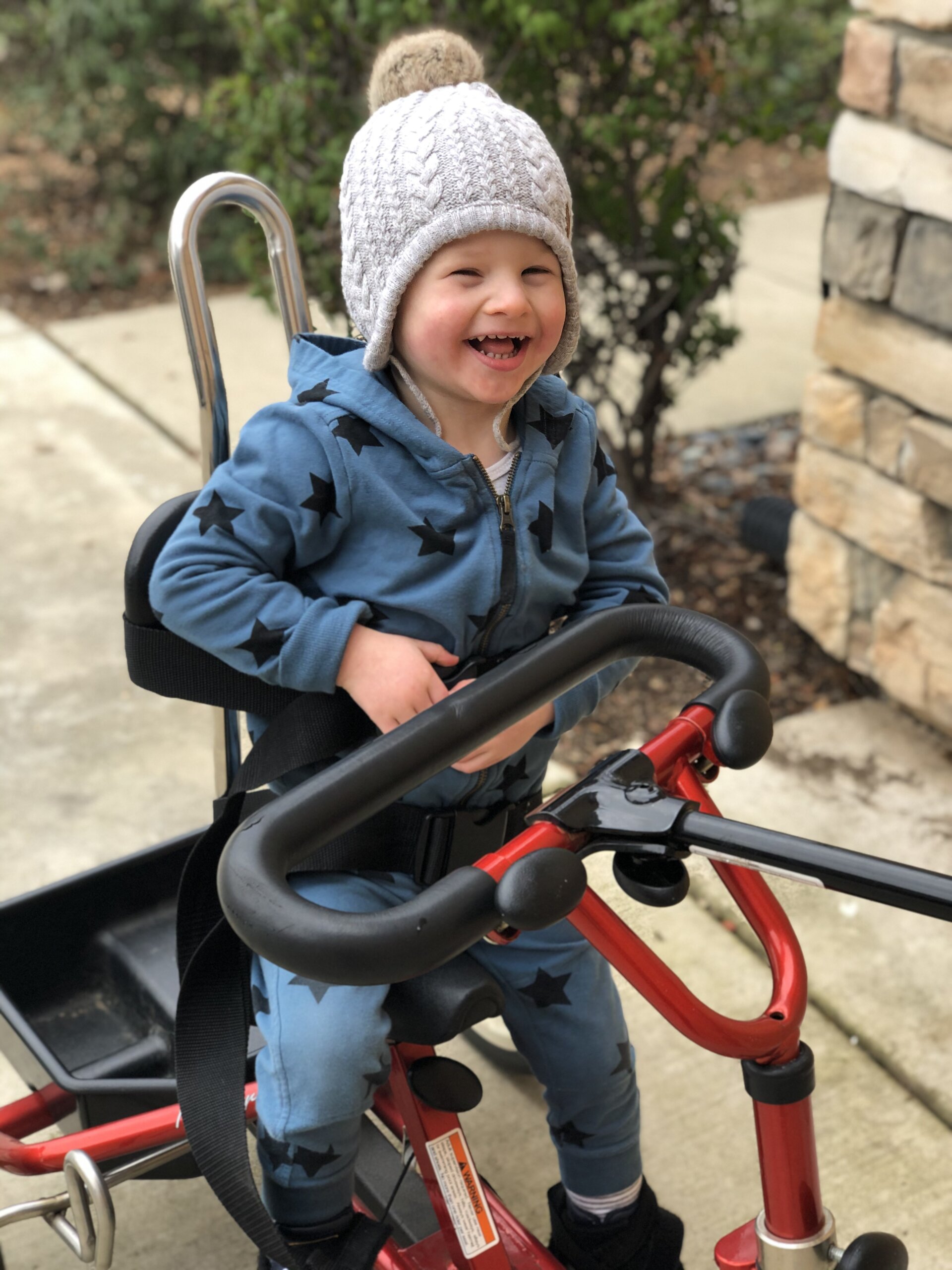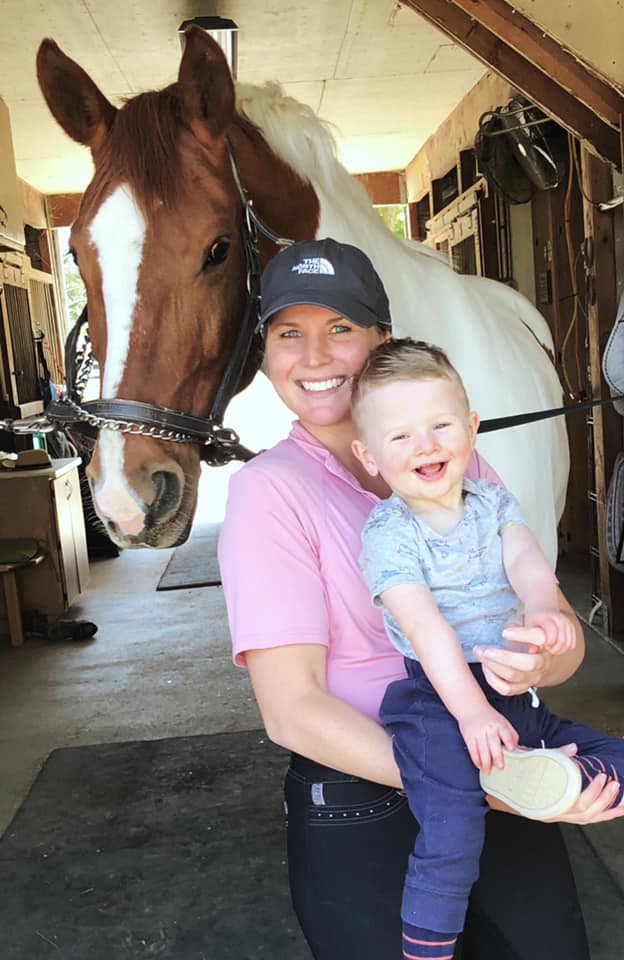Meet Rowan! This absolutely delightful young boy makes his appearance in our Brain Story series as our youngest contributor yet. Rowan’s Brain Story is one about living with Angelman syndrome, a neuro-genetic disorder that occurs in one in 15,000 live births or 500,000 people worldwide. Rowan’s parents, Kaitlin and Nate, agreed to sit down with UBA and discuss Rowan’s story to help others in the community better understand the disorder and to help raise awareness for others just like him.

Angelman syndrome symptoms can range in severity for each diagnosed individual and include lack of speech, intellectual disability, problems with mobility, seizures, and sleep disturbance. As we spoke with Kaitlin and Nate, they let us know that Rowan is a happy, vibrant, and engaging youngster. Children with AS are typically very happy and joyful.
“We are fortunate that AS is a kind of “happy kid” syndrome; 95% of the time, Rowan has a huge smile on his face.”

Join the United Brain Association as we hear more about Rowan, his family, and some of the challenges and treatment plans they’ve utilized to help him develop and grow as a youngster living with Angelman Syndrome.
Living With Angelman Syndrome – Diagnosis and Challenges
As new parents, challenges and uncertainties are constant in our lives. Are we feeding them enough? Why are they crying? Are they “meeting” the scientifically backed milestones? Are they too cold? Did we dress them too warmly? Should we both go back to work? These questions are typical for anyone bringing home a new baby, but in some cases, these questions turn into real concerns.
Rowan’s family first noticed the potential for concern when he reached about nine months of age. “We noticed that he wasn’t sitting up and was actively refusing to try. We were initially told it was likely due to Rowan’s severe acid reflux, and our pediatrician referred him to Physical Therapy. As we approached Rowan’s first birthday and he was still not sitting up, we became more concerned.” After speaking to a business client about their son’s Angelman diagnosis, Kaitlin and Nate dove in to learn more about the disorder. After realizing that Rowan checked all the boxes for symptoms, she and her husband Nate made an appointment followed up with a physical medicine specialist. One appointment led to another, and after a neurologist ran genetic testing panels on Rowan, it was determined that he did have Angelman syndrome.
How has Rowan’s Diagnosis impacted your life?
“It has impacted our lives in almost every aspect. Day-to-day challenges are always present. Rowan brings us incredible joy, and we are so happy to be his parents. We are no longer saving for college but saving for Rowan’s long-term care, legal navigating, and learning about special needs trusts. We need to find ways to protect and care for Rowan for the rest of his life, even after we are gone.”
Rowan’s family has a tremendous network of health care providers, therapists, friends, Angelman syndrome support groups, and incredibly supportive family that help care for their youngest family members. Not only does he attend daycare a few days a week, but he gets to spend time with his grandparents. Rowan’s grandparents and teachers help foster engagement and development, and with their help, he’s growing and thriving.

Angelman symptoms include but may not be limited to speech limitations, short stature, different facial appearances, seizures, bouts of laughter, and uncoordinated movements. Rowan’s parents told us, “Symptoms can vary significantly on a case-to-case basis; AS has a broad spectrum. Rowan has seizures, and others may not. Rowan is quite mobile, and others may not crawl or walk.“
What has been the biggest challenge for you?
“Rowan not being able to tell us how his day was, or if he doesn’t feel right. Wanting to make sure he has friends and is included in social settings. We don’t want him to be left behind because of his diagnosis.”
Rowan is currently 100% non-verbal, so communication is difficult for him with friends and loved ones. While he may be non-verbal, this handsome little guy is currently learning to walk with the help of a walker. His parents tell us that this can sometimes be frustrating for him, especially when playing outside with friends.

Treatment, Support, and Networking
There are various therapies available to help those living with Angelman Syndrome grow and develop with their diagnosis. Rowan’s family helps him thrive, along with a Speech Therapist, an Occupational Therapist, a Physical Therapist, specialized instruction with a Special Education teacher, and warm water therapy. He also had feeding therapy from about 1 to 2 years old due to delays in coordination.
What advice can you share with someone else who has had a family member diagnosed with AS?
“Let yourself grieve. You have lost the child you thought you had, so it’s normal to grieve. Find yourself support. The AS community has been a lifeline for us.”
Rowan’s family chose to share his Brain Story with us to help others living with the disorder understand that the sky’s the limit! Kaitlin and Nate hope that by sharing Rowan’s story, others will learn about AS and the incredibly supportive AS community. “We don’t put limitations on Rowan, and we don’t want anyone to have limitations placed on them just because of a diagnosis.”
“A significant amount of research is being done, including five clinical trials/ gene therapy in progress. Two primary foundations provide an excellent platform for support: The Angelman Syndrome Foundation and Foundation for Angelman Syndrome Therapeutics (FAST).”

When we asked Kaitlin and Nate what brings them and the rest of Rowan’s family joy, they told us, “We try to keep a very positive outlook. We focus on what Rowan can do, not what he can’t do. We work every day to get stronger and to help Rowan get stronger. Most of Rowan’s leaps and progress in development have come from his therapists’ suggestions. They challenge him to do things we would typically feel he is not ready to do. And every time, he does excellent and exceeds our expectations.”
While there is no cure for Angelman Syndrome, promising research published in October of 2020 brings some hope to those living with the disorder. Through gene therapy techniques, treatment for the symptoms of Angelman may see advancements in the near future.
To help support Remarkable Rowan and his team, you can click here to donate. You can also follow him on Instagram @RemarkableRowan!
Do you or someone you love have a Brain Story to share? We’d love to feature you! Head over to our Brain Story page to learn how to submit your Brain Story. To learn more about our mission to find a cure for brain disorders worldwide, please visit our website at The United Brain Association. If you’d like to receive updates, news, scheduled events, or more information about our ongoing donor-funded research projects, sign up for our email newsletter by clicking here. Together we can find a cure for brain disorders.
You Are Not Alone
For you or a loved one to be diagnosed with a brain or mental health-related illness or disorder is overwhelming, and leads to a quest for support and answers to important questions. UBA has built a safe, caring and compassionate community for you to share your journey, connect with others in similar situations, learn about breakthroughs, and to simply find comfort.

Make a Donation, Make a Difference
We have a close relationship with researchers working on an array of brain and mental health-related issues and disorders. We keep abreast with cutting-edge research projects and fund those with the greatest insight and promise. Please donate generously today; help make a difference for your loved ones, now and in their future.
The United Brain Association – No Mind Left Behind




